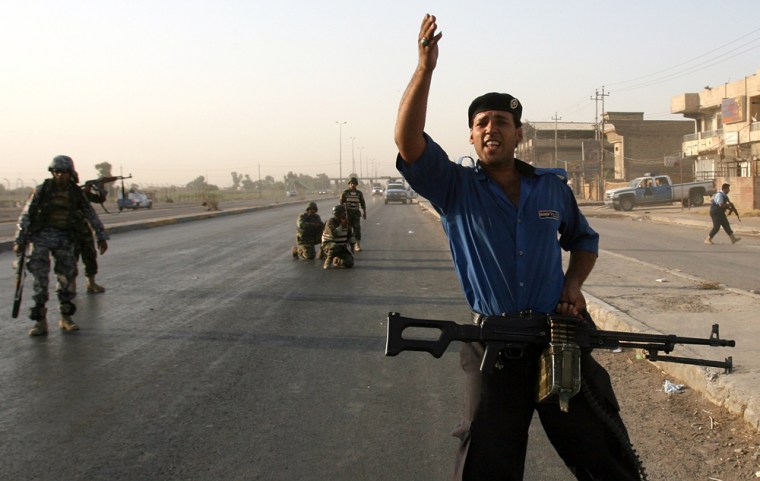A sniper killed a Shiite pilgrim on a Baghdad bridge Monday while another was killed and six injured in other attacks as tens of thousands of faithful made their way to the southern city of Karbala for a major religious commemoration.
Also Monday, the U.S. military reported the deaths of four more service members. Two Army soldiers were killed Sunday in the central province of Salahuddin. Two Marines died in western Anbar province — one on Saturday and the other Sunday, the military said.
The U.S. statement did not give a precise location in Salahuddin for the Army deaths. But the province includes Samarra, where insurgents attacked a U.S. outpost Sunday, triggering gunbattles that ended when a U.S. jet bombed a house where gunmen had taken refuge, and other fighting.
Iraqi officials said eight people, two of them children, were killed. Video by AP Television News showed two bodies in the Samarra hospital, including a boy who appeared to be less than 10 years old, his face caked with dried blood. Police and hospital officials identified the dead as Mohammed Abdul-Wahab, his mother, wife and five of his young children.
U.S. military spokesman Lt. Col. Michael Donnelly told the AP that he only had reports of two civilian casualties, a male and a female who were in a taxi moving through the area during the initial firefight.
“Any civilian casualties are truly regrettable, but it is important to understand that our forces are there to secure the people of Samarra and bring them peace, not bring them harm like the insurgents did,” Donnelly said.
Attempt to protect Shiite pilgrims
Iraqi security forces have mounted a major operation to protect Shiite pilgrims. Sunni religious extremists, including al-Qaida in Iraq, have launched massive and deadly attacks against pilgrims during Shiite celebrations in the past.
Despite the security measures, one pilgrim was shot on Baghdad’s Jadiriyah bridge and gunmen hiding in an orchard south of the capital opened fire on another group, killing one and injuring three others.
Three more pilgrims were injured when gunmen blasted them in a drive-by shooting in southwestern Baghdad and police prevented another attack, defusing two roadside bombs planted along the route to Karbala in Musayyib, about 40 miles south of Baghdad, officials said.
More than a million Shiites from throughout the world were expected to converge on the Shiite holy city for the celebrations, which reach their high point late Tuesday and early Wednesday. The Shabaniyah festival marks the birth of Mohammed al-Mahdi, the 12th and last Shiite imam who disappeared in the 9th century.
Security concerns are running high, in part because of the political deadlock that has paralyzed the government only weeks before U.S. Ambassador Ryan Crocker and Gen. David Petraeus report to Congress on progress here since the arrival of an additional 30,000 U.S. troops.
Key Democrats including Sen. Hillary Rodham Clinton have called for Prime Minister Nouri al-Maliki to be replaced because his Shiite-dominated government has been unable to forge national unity.
Common ground?
In a late meeting Sunday, top government leaders said they had found common ground on some main issues standing in the way of reconciliation.
But the meeting, attended by Crocker, failed to win a pledge by the main Sunni bloc, the Iraqi Accordance Front, to return to the government. This month’s Sunni decision to bolt al-Maliki’s government plunged the country into a political crisis.
The meeting brought al-Maliki together with fellow Shiite Vice President Adil Abdul-Mahdi, Sunni Arab Vice President Tariq al-Hashemi, the head of the northern autonomous Kurdish region Massoud Barzani and President Jalal Talabani, who is also a Kurd.
They said they agreed on some issues that the United States has set as benchmarks for progress, among them holding provincial elections, releasing prisoners held without charge and changing the law preventing many former members of Saddam Hussein’s Baath Party from holding government jobs and elected office.
But no details were released and committees must hash out final versions of legislation to be presented to parliament. Iraqi officials have announced similar deals in the past, only to have them fall apart.
Nevertheless, White House spokeswoman Emily Lawrimore called the resolution an “important agreement.”
It is “an important symbol of their commitment to work together for the benefit of all Iraqis,” she said in an e-mail statement. “We will continue to support these brave leaders and all the Iraqi people in their efforts to overcome the forces of terror who seek to overwhelm Iraq’s democracy.”
Al-Maliki lashes out
Before the meeting, al-Maliki lashed out at American critics, saying Clinton and other Democrats who have called for his ouster should “come to their senses” and stop treating Iraq like “one of their villages.”
He also lambasted the U.S. military for raids in Shiite neighborhoods of Baghdad, adding new strains ahead of next month’s showdown in Washington over the future of the U.S. mission.
The grim combination of ongoing violence and political deadlock have increased frustration in both Washington and Baghdad, with American lawmakers increasingly critical of al-Maliki’s performance and Iraqi leaders growing weary of what they consider unfair U.S. criticism.
Al-Maliki denounced recent U.S. military actions in the Baghdad Shiite neighborhoods of Shula and Sadr City that Iraqis say have resulted in civilian deaths. The U.S. military said eight “terrorists” were killed but no civilians.
In a new operation early Monday, U.S. troops detained eight terrorist suspects in Sadr City, saying they were believed to be part of a network known for bringing in the particularly lethal explosively formed penetrators, or EFPs, from Iran to Iraq, spokesman Lt. Col. Christopher Garver said. No shots were fired during the pre-dawn raid.
